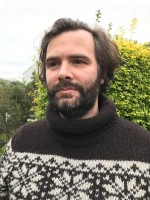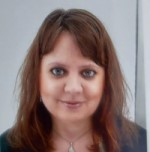Biography
Andrew Clarke is a 2nd year PhD candidate in Maynooth University and an Irish Research Council Government of Ireland Scholar. He holds degrees from Trinity College Dublin and Dublin City University and an MA in Literatures of Engagement from Maynooth University. His dissertation is entitled '"Describe the problem properly": Hybridity and Ambiguity in the work of Teju Cole.' His wider research interests include postcolonial literature, affect theory, photography, and anti-racist writing. He is a member of the Irish Association of American Studies (IAAS) and the Irish Network of Middle Eastern and North African Studies (INMENAS). He has extensive experience as a secondary school teacher and as a teacher of English as Foreign Language to adult learners. He lives in Stoneybatter in Dublin.
Abstract
The Nigerian-American writer and photographer Teju Cole has emerged as a highly respected novelist, critic, art historian, and visual artist of the twenty-first century, probing questions of race, migrancy and forced displacement. Despite this, there has been no monograph devoted solely to Cole, nor any work that fully examines the intermediality of his oeuvre. This thesis explores Cole’s diverse work according to what I see as a connective and hybrid 'aesthetics of uncertainty' that ranges across his fictional, critical, and photographic work. It critiques how he uses his writing and photography to embody hybridity and ambiguity, two of the key theories in postcolonial thought, and how he creates an 'aesthetics of uncertainty' as a means of affectively portraying our contemporary crises, responding to and provoking questions around racial discrimination, forced displacement and mass inequality. I read Cole’s fictional work through the lens of postcolonial theory by Homi Bhabha, Gayatri Spivak, Ania Loomba, and Kwame Anthony Appiah, among others. I examine how Cole’s work as an essayist and photography critic places him in the line of public intellectuals such as James Baldwin, bell hooks and Edward Said, in empathetic activism. In his visual work I examine his development of an ‘aesthetics of uncertainty’ that acts as a means of “unlearning imperialism”, as visual theorist Ariella Azoulay puts it, and embracing Spivak’s concept of ‘planetarity’ – refusing to view the world as a manageable and controllable entity, wherein those who are Othered also become controlled. This is a comprehensive, interdisciplinary and deeply analytical exploration of Cole’s work, taking account of his vast and diverse range of stylistic and theoretical influences. It makes a persuasive case to consider him as a major artist and intellectual for our times, with a rich and nuanced body of work.
I began this project in September 2020, on a part-time basis, aided by a fee waiver from the John and Pat Hume Scholarship. An Irish Research Council Government of Ireland Postgraduate Scholarship has enabled me to work on the project full-time since September 2021. The primary supervisor of my work is Dr Catherine Gander, assisted by Dr Rita Sakr as secondary supervisor.
Activities:
My first published piece was “The fire is Not in the Future”: Reflections on American Studies in a year of crisis,” in Irish Journal of American Studies Online in January 2021 http://ijas.iaas.ie/issue-9-andrew-clarke/
I have also reviewed Teju Cole’s essay collection, Black Paper for US Studies Online in November 2021 https://usso.uk/book-review-black-paper-writing-in-a-dark-time-by-teju-cole/
I delivered a paper entitled “The Bridge from Shadow into Light”: Salvaging the obscure in Teju Cole’s Blind Spot’ to the annual conference of the Irish Association of American Studies in April 2021.
I delivered a paper entitled “Museum of Wounds”: Teju Cole’s Lebanese Image-texts’ to the inaugural Irish Network of Middle Eastern and North African Studies postgraduate symposium in November 2021
Biography
Eszter György is a third-year PhD student, graduate teaching assistant and recipient of the John and Pat Hume Doctoral Scholarship. Her dissertation explores intermediality in Oscar Wilde’s poetry; that is, the significance of Wilde incorporating other art forms, such as painting, music and dance, into his literary style. This work is currently being supervised by Dr Michael G. Cronin.
Eszter graduated from Sorbonne Université- Faculté des Lettres (Paris IV), where she got her undergraduate degree in Modern Literature and her MA degree in English Literature. She was twice awarded the Erasmus+ grant to English-speaking countries. She studied as an Erasmus at the University of Warwick and she also completed an Erasmus-year at the School of Celtic Studies of Maynooth University, where she got the Certificate in Irish Cultural Heritage. Eszter speaks Hungarian, English, French, Spanish, along with some Italian and Irish.
Research project- Abstract
The aim of my PhD is to study and map intermediality in Oscar Wilde’s poems. Wilde’s first volume of poetry (‘Poems’, 1881, 1882) is often described as an eclectic symphony. The volume’s rich intermedial allusiveness will enable me to examine the cross-fertilization between various art forms in Wilde’s poems. Wilde’s poetry establishes important intermedial links with earlier and contemporary literary material, visual art, music, dance and even life sciences. By sketching a “discursive cartography” of Wilde’s poems, I will study his intellectual engagement with Aestheticism and Decadence, shifts in his aesthetic style and poetic diction, along with a typology of different intermedial forms in his poetry in order to offer a new understanding of the way he transmits his aesthetic principles.
Eszter has presented her research on Wilde at various conferences and symposia.
Publications
City Lyrics in a “Sensible Age”: Intermediality and Intersensoriality in Oscar Wilde’s Impression du Matin (1881) and “Symphony in Yellow” (1889), Journal of Comparative Literature and Aesthetics Vol. 47, No. 2, Summer 2024
Special Issue – Intermedial Poetries: Alternative Methods and Practices
Review: Neil Titley’s ‘Work is the Curse of the Drinking Classes’ starring Will Govan as Oscar Wilde, Intentions Number 127, November 2023 (The Oscar Wilde Society, UK).
Considering liminality as a passage to the Otherworld in the early Irish tale “Aislinge Óenguso” and Oscar Wilde’s “The Fisherman and his Soul”, Freeside Europe Online Academic Journal, Issue 11
Presentations
The “Wilde-eyed” Man of the World: Intermediality in Oscar Wilde’s Metropolitan Impressions (presentation at MLA Convention 2024 Philadelphia, “Wilde on Tour”, 6th of January 2024)
“Monstrous Tulips and the ‘Celtic Giant’s’ garden of Echoes: Musicality, Sexuality, and Intertextuality in Oscar Wilde’s ‘The Garden of Eros’” (presentation at UCLA “Forging Ahead: Fakes, Fabrications, and Facsimiles in Cultural and Literary History – Medieval to Modern” Symposium, UCLA Clark Memorial Library, 5th of May 2022)
The “danse macabre” of the “Faithful Dear Heart”: a study of Oscar Wilde’s “The Harlot’s House” (presentation at the 2nd Annual MU Symposium on Genders and Sexualities, 7th of December 2021)
Poetry or propaganda? Art as criticism in Oscar Wilde’s “The Ballad of Reading Gaol” (presentation at the MU Poetry and/as Criticism Symposium, 21st of March 2022)
Wilde Wit:
Wilde Wit entry shortlisted among the best 20 entries at the Third Wilde Wit Competition (The Oscar Wilde Society, UK): “We live in an age where beauty is abandoned. We should live in an age where abandon is beautified.”
Contact
[email protected]
Biography
Reema Hassan is a PhD candidate in the Department of English. Irish and Iraqi in background, Reema was born and raised in the United Arab Emirates before moving to Ireland in 2004. She holds a BA in Sociology and English and an MA in English (Literatures of Engagement), both of which were undertaken in Maynooth University. Reema’s doctoral research is on post-2003 Iraqi prose fiction, with a particular focus on representations of the body and the environment, through an interdisciplinary engagement with the Environmental Humanities. Reema is a recipient of a fully-funded Departmental Scholarship, awarded by the Department of English in Maynooth in 2019. Her supervisor is Dr Rita Sakr
Abstract
There has been a notable movement towards the use of experimental fiction by Iraqi writers in the aftermath of the 2003 US invasion of Iraq. In a departure from social realist literary traditions historically prevalent in twentieth century Iraqi prose fiction, post-2003 Iraqi writers frequently incorporate phantasmagorical, fantastic and horror tropes that fall within the broad category of speculative fiction. These works also share similarities through an underlying preoccupation with issues of environmental crisis/injustice such as water access denial, land dispossession, and displaced communities situated amid sites of the rampant oil imperialism/capitalism implemented by the petro-imperialist US forces. This research will identify this sudden shift in genre in Iraqi prose fiction and will explore concurrent, thematic environmental concerns shared among the works. Contemporary Iraqi writers are acutely concerned with the long-term devastating effects of environmental degradation/exploitation and are not only aware of its effects on the physical environment but also explore its impact on the human body in literature that (re)imagines the potentials of experimental fiction in articulating Iraq’s “energy narrative”. The research questions are therefore: why did a shift in genre occur in Iraqi literary fiction post-2003? What is the significance of the representation(s) of energy in these works/the use of experimental fiction? Can literary-critical analysis be used to evince the “energy narrative” of a nation? This research is guided by the formation and application of a refined biopolitical paradigm that is situated at an interdisciplinary node in the energy humanities where literary analysis intersects with critical-geographical and political-philosophical inquiry. The research will examine the novels Frankenstein in Baghdad (2013) by Ahmed Saadawi, The Corpse Washer (2013) by Sinan Antoon, and God 99 (2020) by Hassan Blasim. The research will also examine additional work by Hassan Blasim, namely his collections of short stories entitled The Madman of Freedom Square (2009), The Iraqi Christ (2013), and The Corpse Exhibition and Other Stories of Iraq (2014).
Publications:
Hassan, Reema. "Frankenstein in Baghdad". The Literary Encyclopedia. Volume 6.1.3: Middle-Eastern Arabic Writing and Culture: Modern and Contemporary. Published 04 November 2020.
Events:
Presented: Irish Network for Middle Eastern and North African Studies (INMENAS) Networking Event on 16th November 2020
Hosted: Co-hosted a webinar with Dr. Rita Sakr on 29th March 2021 entitled ‘A Conversation with the Iraqi-born writer Hassan Blasim’ through the English Department at Maynooth University.
Organising Committee: the first Irish Network for Middle Eastern and North African Studies (INMENAS) Postgraduate Symposium (entitled ‘New Approaches to Interdisciplinarity in MENA Studies’) which took place on 12-13 November 2021.
Contact
[email protected]
Biography:
Nadia (Konstantina) Koukaroudi is a PhD candidate in the English Department of Maynooth University. She holds a degree in English Language and Literature and an MA in English Literature, focusing on ancient Greek myth retellings in Anglophone literature, from the National and Kapodistrian University of Athens. Her research project is entitled “And She Lived Queerly Ever After; Queering Contemporary Anglophone Fairy Tale Retellings”, focusing on queer temporalities and kinship in post-1990 fairytale retellings.
Abstract:
Fairy tales are part of humanity’s collective heritage, as they are not limited by space, time, cultural and social boundaries. Fairy tale rewriting has thus become a means for contemporary authors to address discourses related to genders and sexualities. Focusing on post-1990 retellings for young adult readers of Cinderella, Beauty and the Beast, Snow White, Rapunzel and Sleeping Beauty, my research explores how these retellings stray away from the ‘traditional’ stories while creating transformative spaces. By rejecting traditional happily-ever-after gender stereotypes, these fairy tale retellings written among others by Emma Donoghue, Francesca Lia Block, Neil Gaiman and Deirdre Sullivan, present radical visions of female empowerment and queer kinship. My research draws upon the theory of ‘queer temporalities’ as developed by Elizabeth Freeman, so as to present the reoccurring textual queer moments that associate time with transformation, casting thus the well-known fairy tale characters outside of heteronormative time. In addition, the disruption of heteronormative time and gendered expectations is analysed through Jack Halberstam’s interpretation of ‘queer time’. Influenced by Freeman’s concept of ‘queer belongings’, this research additionally explores the alternative forms of community and kinship that queer bonds produce in the fairy tale retellings. By bringing these theoretical concepts in dialogue with each other and examining how they interact with each contemporary retelling, my research offers a new perspective of the fairy tale retelling genre; one in which the tales that inspired and educated us as children are now the means of redefining genders, sexualities and spaces of belonging.
I began this project in September 2021, having Dr Michael Cronin as my primary supervisor and Dr Patricia Kennon (School of Education) as my secondary supervisor.
Biography
Seán Ó Cinnéide is a third-year doctoral student whose research interests include modern Irish and Anglo-American literature; Marxist cultural studies; memory studies; and literary ethics. After completing a BA in English and History (2016) and an MA in Irish Literature and Culture (2017) at Maynooth University, he returned in 2019 to pursue a PhD funded by Maynooth’s John and Pat Hume Scholarship, and supervised by Dr Oona Frawley and Dr Michael G. Cronin.
Project
“Irish literature and the European crisis, 1939-55: History, memory, ethics”
My thesis studies the problem of narrativizing crisis in mid-twentieth-century Irish fiction, considering how literary responses to the period’s ethical dilemmas are informed by varied identifications with a sense of historical peripherality. Amid a crisis interpreted by some as the product of modern rationality, scientism, and bureaucratization, European conceptions of reason, universalism, and historical progress are subject to interrogation; anxieties regarding their failures or frailties trouble European literature of the period, in which received notions of the past are constantly disturbed by the realities of the present. As a complex set of ethical challenges arise on the continent in the 1940s, bound up with the larger project of postwar reconstruction, a number of Irish authors contend with a consciousness that many of the same ideas underpinning mid-century ethical discourse had historically been instrumentalised to facilitate colonial subjugation and legitimate imperialist ideology. Drawing on scholarship in memory studies and literary ethics, I study these concerns in the work of Dorothy Macardle, Elizabeth Bowen, Olivia Manning, Francis Stuart, Máirtín Ó Cadhain, and Samuel Beckett.
Conference Papers
ACIS (American Conference for Irish Studies) Annual Conference
Event: Heritage, Healing, and Home, 2-5 June 2021 [Ulster University, Online]
Paper: Dorothy Macardle and the perplexities of human rights
British Association of Modernist Studies Postgraduate Forum
Event: New Work in Modernist Studies, 11 Dec. 2020 [Edinburgh Napier University, Online]
Paper: ‘Deprived of heroism’: Gendering modernity in Elizabeth Bowen’s The Last September
Common Ground Postgraduate Conference
Event: Divided Selves and Societies in Irish and American Literature and Culture, 27 Oct. 2018 [Queen’s University Belfast]
Paper: Gender, trauma, and cultural memory in Deirdre Madden’s Hidden Symptoms and One by One in the Darkness
Book Review
Irish University Review – Vol. 51, No. 2 (2021)
Melania Terrazas Gallego (ed.), Trauma and Identity in Contemporary Irish Culture (Oxford: Peter Lang, 2020).
Contact
[email protected]
Biography
Alan Waldron is a creative arts practitioner with academic interests in contemporary performance practices, historical silences and cultural trauma. Even more so, he is interested when these areas are brought into contact through practice as research, and the opportunities which may result from working in such a way. Alan holds an MA from Cardiff University and a BA from the University of Wales Trinity Saint David (UWTSD). His MA dissertation was a Practice as Research project which involved the creation and documentation of an academic screenplay, which focused on historical silences surrounding the involvement of Irish soldiers in the First World War, and silences in contemporary Irish society. He also worked for many years in both HE and FE settings and in a variety of roles, such as organising and facilitating events, community engagement and, of course, teaching. Of particular note was his involvement as a researcher on two pan-GB CITB funded projects which aimed at facilitating early and sustained engagement between the construction industry and schools, both of which have been successfully rolled out across the United Kingdom.
Research Project
“For his studies, Alan is undertaking a Practice as Research (PAR) project which focuses on creatively engaging with seldom-performed dramatic texts which are both from Early Modern Ireland (1639-1663) and represent Early Modern Ireland on the stage. Building on Joanne Tomkin’s idea of the heterotopic possibilities that lie within staging performances in a physical way that disrupts or disturbs our understanding of the source text, this project seeks to explore the opportunities that exist when the abstracted depictions of the social, cultural and political milieu of Early Modern Ireland come into contact with the concrete world of contemporary Ireland, both physically and metaphorically. Through blending the ideas of Gaston Bachelard approaches to space and our relationship with it, alongside the creative and collaborative performance practices of Jacques Lecoq and Frantic Assembly, we will focus in particular on the creative process which develops through the playing with, and staging of, Katherine Phillip’s Pompey, James Shirley’s St. Patrick for Ireland and Richard Head’s Hic et Ubique.”
Alan’s PhD studies began in September of 2020 under the supervision of Professor Pat Palmer and also Dr Deana Rankin of Royal Holloway, University of London. His PhD is funded by the IRC in their wider funding of Professor Palmer’s MACMORRIS project, which seeks to map the full range and richness of cultural activity, across languages and ethnic groups, in Ireland from 1541 to 1691. Aside from the research aims of the project itself, this creative exploration of Early Modern texts produced in Ireland will provide an illustrative and engaging case study to highlight the complex vibrancy of cultural life in Ireland in the turbulent years of the mid-17th century.
Publications, etc.
Research Publications:
2019 – CITB/Keir Construction, “Go Construct Engage Report.”
2018 – CITB/Bouygues UK, “Contextualised Curriculum Report.”
Performances:
2022 – Maynooth University/UCD/Trinity College joint production, Pompey. Smock Alley Theatre, Dublin. Producers: Danielle Clarke (UCD) and Miranda Fay Thomas (TCD).
2021 – Construction Wales Innovation Centre, CONVERT Immersive Learning – short animation. Scripting and voiceover work.
Papers given:
2018 - International Entrepreneurship Educators Conference (IEEC), “What becomes of Creative Artists?”
Contact
[email protected]
Biography
Orlagh Woods is a 4th year doctoral student, graduate teaching assistant and recipient of the John & Pat Hume Doctoral Scholarship. Her dissertation explores representations of motherhood across a range of 21st Century adaptations of Shakespeare by prominent female authors. Her research is co-supervised by Dr. Stephen O'Neill and Dr. Moynagh Sullivan. While her current work focuses specifically on literary adaptation, her wider research interests include stage performance and cinematic adaptation as well as contemporary women's writing.
Abstract:
Stories are how we connect with each other, and the stories a culture tells about itself underline thee values it holds important. When widely circulated stories continue to erase, neglect or absent the mother, then we must ask – how does that culture value motherhood? The strongest stories are strengthened by retelling and Shakespeare’s work is too powerful to forget, but contemporary authors can influence how we remember it. Within the realm of Shakespeare studies, adaptation constitutes a “brave new world” (Lanier 294) and since the turn of the twenty first century, there has been an expanding body of work that variously revises, extends and indeed challenges the limits of original play texts. Feminist criticism of Shakespeare is a well-established field in its own right but I have identified a significant gap in the critical literature pertaining to motherhood in contemporary Shakespeare(s). Mothers are very rare in Shakespeare. The few that do appear are haunted by Madonna or Medea. They are either gracious, obedient and self-sacrificing or they’re vengeful, hyper-sexual and all-consuming. Contemporary authors must negotiate this archetypal inheritance with our evolving understanding of gender, mothering and society. Throughout the twenty first century, same sex marriage, adoption, reproductive rights and more recent reproductive technologies that distinguish the gestational and genetic mother have drastically expanded the territory of motherhood. This thesis seeks to intervene in these dynamic fields by attending to the figure of the mother in contemporary novels by prominent writers Jeanette Winterson, Anne Enright and Preti Taneja. It will demonstrate how the novels themselves are producing new representations of motherhood that are responsive to and indeed constitutive of, the times we live in. The expanding aggregate of Shakespearean adaptations provides conducive space for women and mothers to “write themselves” and to challenge the fixed, linear structures of patriarchal literary inheritance.
Conferences and publications:
“Locating Shakespeare: The Digital Remapping of Shakespeare in Light of the Emma Rice Controversy at The Globe” European Shakespeare Research Association Conference, Rome. July 2019.
“She Lives in Shakespeare: Representations of Motherhood in Jeanette Winterson’s The Gap of Time”, British Graduate Shakespeare Conference. September 2020.
“This creature, this woman, this elf, this sorceress, this forest sprite: Negotiating Authorship and Reconfiguring Motherhood in Maggie O’Farrell’s Hamnet” Maynooth University Motherhood and Work Conference. August 2021.
“A King of Infinite (Cyber) Space? The Digital Remapping of Shakespeare in Light of the Globe’s Emma Rice Controversy”. Lingue E Linguaggi, vol. 45, 2021. Pp. 113-131.
Contact
[email protected]






